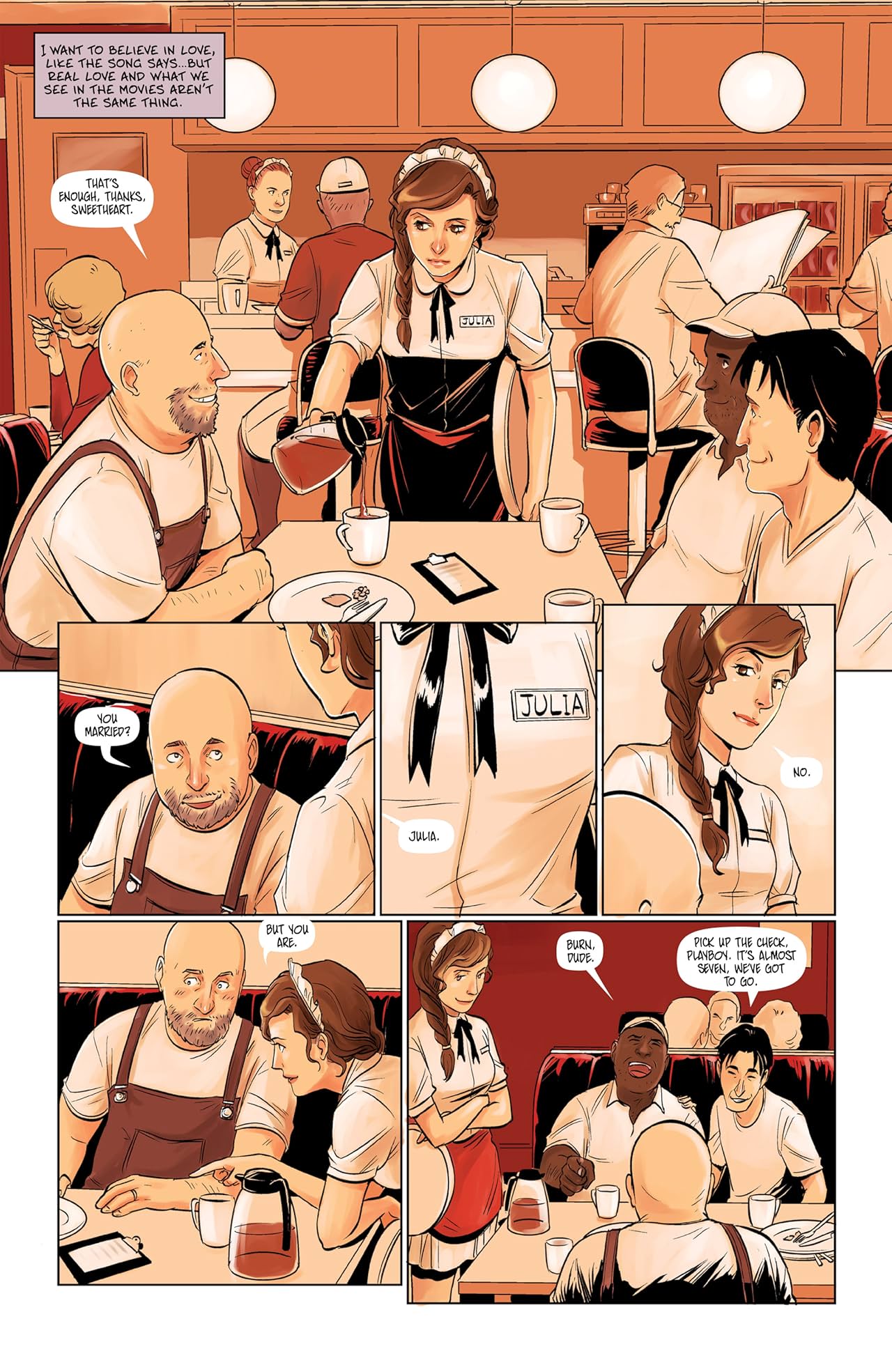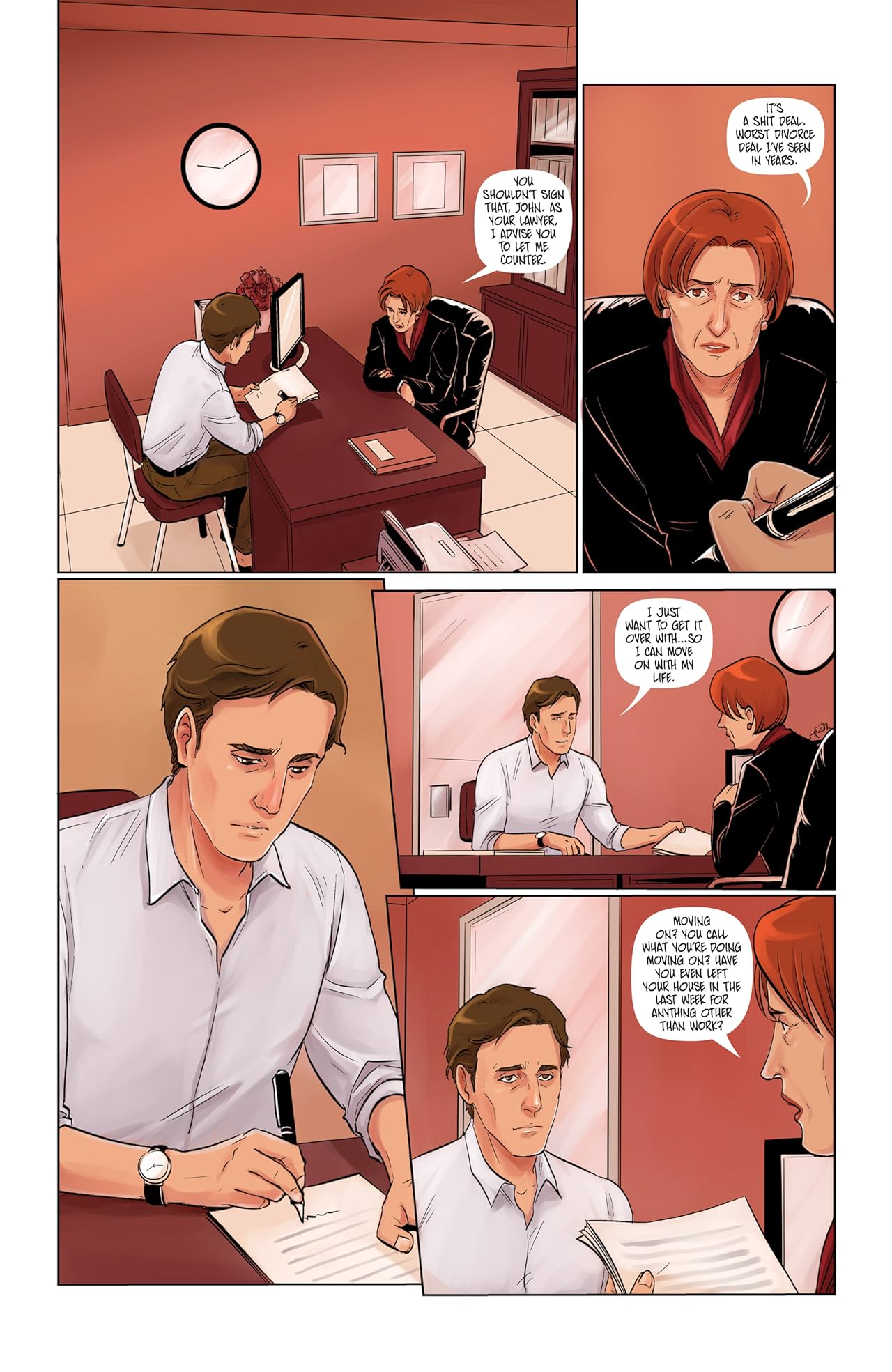
Not every love story begins with a daring rescue followed by a witty exchange, culminating in an act of passionate lovemaking. Fairy tales and romantic comedies tend to present an obscenely skewed picture of how love actually manifests. In the same way porn gives fanciful depictions of sex, most love stories present an idealized, but flawed understanding of romance.
To be fair, though, love in the real world tends to lack that magical nuance. That’s why those fanciful depictions have so much appeal in the first place. It’s also why “Sugar,” the latest slice-of-life graphic novel from Matt Hawkins and Jenni Cheung, brings something interesting to the world of romance.
It doesn’t involve superheroes. It doesn’t involve elaborate emotional entanglements, either. It’s just a unique, engaging, and distinctly sexy story that resonates in the current year. This being the same creative team behind “Swing,” another novel love story that I lauded earlier this year, the bar is higher than most.
While I’ll won’t say “Sugar” is better than “Swing,” it has plenty to offer for those looking for a different kind of love story. This is not one of those boy-meets-girl or girl-crushes-on-cute-guy narratives that follows a familiar script. It doesn’t try to reinvent the genre, either. Instead, it takes two characters who find themselves in frustrating, but believable predicaments and has them find each other in a unique way.
Julia Capello and John Markham aren’t eccentric personalities with extreme quirks. Julia is a 23-year-old college student working multiple jobs, constantly worrying about tuition and her financially struggling mother. It’s not a ground-breaking basis for a young woman, but it never comes off as overly-tragic. Hers is a story that many young people today can relate to.

The same goes for John, a middle-aged businessman who thought he did everything right. He married his high-school love, created a thriving business, and played by the rules that men believe they’re supposed to follow. Then, out of nowhere, he finds out his wife is cheating on him and she serves him with divorce papers. In an instant, everything he thinks he knows about love is shattered.
These are two people with significant emotional deficits. Julia makes it clear that being alone doesn’t sit well with her. Her love of romance movies and her reactions to her roommates kinky antics with her boyfriend make that apparent. John is broken and lonely, needing a new connection to fill the void that his ex-wife left in his heart.
How they come together isn’t that romantic, in terms of logistics. Their first interaction is an otherwise forgettable joke in diner. However, their paths eventually cross again, this time with much sexier interactions. Instead of turning into a traditional relationship, though, these two follow a different path.

This is where “Sugar” twists the standard romantic narrative. Instead of two people coming together in moments that go onto inspire Taylor Swift songs, they end up following a much messier path. John, who is still very hung up on his wife, doesn’t jump into another relationship. Instead, he seeks an “arrangement,” of sorts.
Instead of an actual girlfriend, he asks Julia to be her sugar baby. That’s a term that exists in the real world and often gets conflated with prostitution. In fact, that’s a common refrain throughout “Sugar.” Julia goes out of her way to belabor the fact that she’s not just exchanging sex for money. It’s worth belaboring too because that’s not the crux of their arrangement.
Yes, the arrangement does involve sex.
Yes, the arrangement does involve activities associated with dating and relationship.
No, the arrangement does not involve the promise of marriage, kids, and a white picket fence.
No, the arrangement does not involve contracts, dungeons, and bondage in the mold of “50 Shades of Grey.”
In practice, it doesn’t necessarily convey the traits of an epic love story. It doesn’t depict that of a kinky porno, either. The arrangement between Julia and John serves a defined purpose that benefits them both.
John is someone who has spent most of his life in a relationship. Being alone for him is untenable. Julia is someone who clearly wants intimacy, but struggles to fit it into her hectic life. The arrangement they pursue together fulfills them both in a particular way. John gets companionship. Julia gets intimacy and some badly-needed financial support.
If that were the only result of the arrangement, though, there wouldn’t be much of a story. It doesn’t take long before Julia and John encounter various complications to their arrangement. Emotional entanglements do enter the picture. Some of them are a bit predictable, but others are less obvious.

There’s an underlying sense that neither character really understands what they feel for one another. John often finds himself pulled in multiple directions by his emotions whereas Julia tends to make more assumptions than she should. It makes for an eventful emotional journey, which leads to some interesting choices in the end.
When all is said and done, “Sugar” comes off as a real love story, but in an indirect sort of way. It take a strange, meandering path to get to that point, but it still gets there. While a second volume of the story is teased at the end, the story feels complete. There’s a sense that both Julia and John take a step forward in their lives, both together and as individuals.
There are a number of flaws with how “Sugar” goes about guiding Julia and John through the story, though. Neither character has much of a supporting cast. Both Julia and John are surrounded by archetypes with the personality depth of meathead jocks from 80s teen movies.
John’s business partner, Richard, is basically a well-dressed frat boy whose only role is to present the idea of an “arrangement.” His ex-wife, Karen, is even less developed. She is the personification of everything that rabid anti-feminists dread, a callous bitch who preys on the emotions of rich men while indulging her hedonistic proclivities on the side.

Julia’s supporting cast isn’t much better. Aside from a roommate who constantly encourages her to get laid and bosses that see her as nothing more than a cog with a pretty face, there’s nobody that really complements her. The people around her are just extra and bring little to the table.
On top of that, there are times when Julia and John rely too heavily on tired tropes. John has a few moments where he tries to be a White Knight and Julia has a few moments where she tries to be overly independent to the point of being an asshole about it. While these parts of the story can be eye-rolling at times, they don’t take away from the overall story.
At its core, “Sugar” is still a love story. It’s just a very different kind of love story. It takes two people in need of love and brings them together, albeit in an unorthodox way. It still works, though. It still evokes just the right emotion without resorting to princesses and dragon-slaying.
If I had to score “Sugar,” I would give it a 7 out of 10. It’s a solid, above-average story that applies just the right amount of romance and sex appeal. It has a novel concept that has plenty of potential, sexy and otherwise. It lacks the various support structures necessary to make it feel complete. Compared to “Swing,” it doesn’t quite measure up in terms of refinement.
Unlike “Swing,” this is a love story that feels more definitive. It’s concise, streamlined, and genuine in ways that few love stories dare to be in an era where one or more love interests has to be a superhero. Hawkins and Cheung once again achieve something special and sexy with “Sugar.” It may never be an epic love story that inspires a James Cameron movie, but it doesn’t have to in order to be sweet.



Pingback: Announcement: New Approach To Website | Jack Fisher's Official Publishing Blog
Pingback: Swing Volume 3 Review: How An Open Marriage Matures | Jack Fisher's Official Publishing Blog